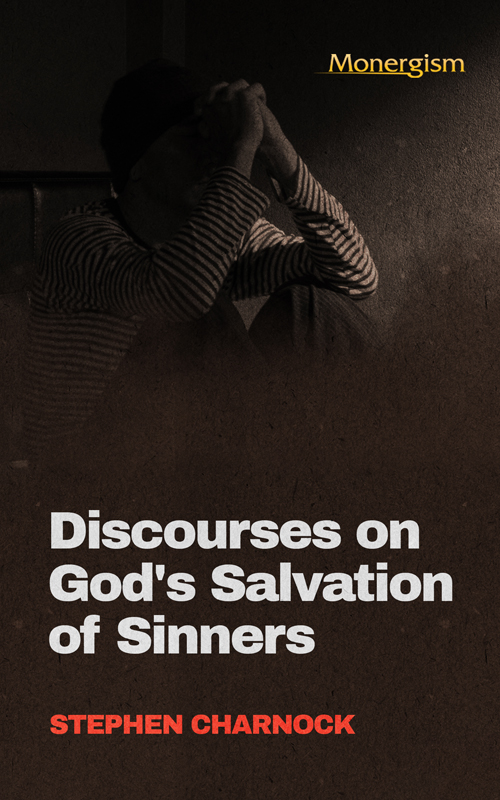 by Stephen Charnock
by Stephen Charnock
in ePub, .mobi and .pdf formats
Stephen Charnock’s Discourses on God’s Salvation of Sinners is a theological masterpiece that probes deeply into the heart of the gospel. With penetrating insight, Charnock examines the necessity, nature, and means of regeneration, offering one of the most robust treatments of the doctrine ever written. The book is structured around key discourses, including the necessity of regeneration, the instrumental role of the Word in conversion, the cleansing power of Christ’s blood, and God’s ultimate glory in saving sinners. Charnock’s exposition is both doctrinally rich and deeply pastoral, confronting the reader with the absolute necessity of being born again. He dismantles self-righteousness, exposing the utter inability of fallen man to save himself, and exalts the sovereign grace of God in bringing dead sinners to life. His discourse on the chief of sinners being saved is particularly powerful, displaying the boundless mercy of God towards even the most hardened rebel. This is not merely a theological treatise—it is a soul-searching, Christ-exalting call to repentance and faith.
While regeneration is a major theme—rightly so, as no one can enter the kingdom of God apart from being born again—this book offers much more than just an exposition of the new birth. Charnock masterfully weaves together doctrines of conversion, justification, atonement, and divine glory, demonstrating how God, in saving sinners, magnifies His own majesty. His arguments are weighty, his exegesis profound, and his application deeply convicting. Each discourse carries the thunder of biblical truth, dismantling any notion of self-righteousness and exalting Christ as the only hope for guilty souls.
Among the many treasures in this work, three sermons stand out as absolutely essential reading:
“The Chief of Sinners Saved” is a glorious exposition of the Apostle Paul’s testimony (1 Timothy 1:15), proving that no sinner is beyond the reach of God’s grace. Charnock lifts the curtain on the scandalous mercy of God, showing that salvation is not for the righteous but for the wretched. This discourse is a balm for the burdened conscience and a dagger to human pride.
“God’s Regard for His Own Glory, Seen in the Saving of Sinners” is a breathtaking exploration of why God saves at all. Charnock argues that the ultimate end of salvation is not merely the good of man, but the display of God’s divine attributes—His justice, mercy, wisdom, and power. If you want to see the gospel from God’s perspective, this sermon will reshape your understanding of redemption and make you stand in awe of God’s greatness.
“The Fruits of Converting Grace in the Salvation of Sinners” moves beyond justification to the evidence of true conversion. Here, Charnock crushes any idea of an empty, fruitless faith. A genuinely converted soul will bear the unmistakable marks of grace—repentance, holiness, love for Christ, and obedience to God’s Word. This sermon is a searching test for every professing believer, challenging us to examine whether we are truly in the faith.
Charnock does not write for those content with shallow religion. He demands that we reckon with the weight of our sin, the splendor of God’s holiness, and the freeness of His grace. These sermons will make you tremble, weep, rejoice, and worship. They will crush false hopes and strengthen true ones. This is biblical theology at its finest—uncompromising, exalting God, humbling man, and directing all eyes to Christ.
About the Author:
Stephen Charnock (1628–1680) was one of the greatest Puritan theologians, renowned for his intellectual rigor and spiritual depth. Best known for The Existence and Attributes of God, Charnock’s sermons and discourses continue to shape Reformed thought. He served as a chaplain in Ireland before co-pastoring with Thomas Watson in London. His writings are marked by a fierce commitment to the sovereignty of God, an unshakable trust in Scripture, and a passion for exalting Christ. Few theologians have combined doctrinal precision with such searching pastoral application, making his works invaluable for serious students of the faith.
-----
TABLE OF CONTENTS
A Discourse On The Necessity of Regeneration
A Discourse of the Word, the Instrument of Regeneration
A Discourse of the Nature of Regeneration
The Chief of Sinners Saved
A Discourse of the Pardon of Sin
God's Regard for His Own Glory, Seen in the Saving of Sinners
The Fruits of Converting Grace in the Salvation of Sinners
A Discourse On God's being the Author of Reconciliation
A Discourse on the Cleansing Virtue of Christ's Blood
A Discourse On The Efficient of Regeneration
- Born of God Part 1
- Born of God Part 2
